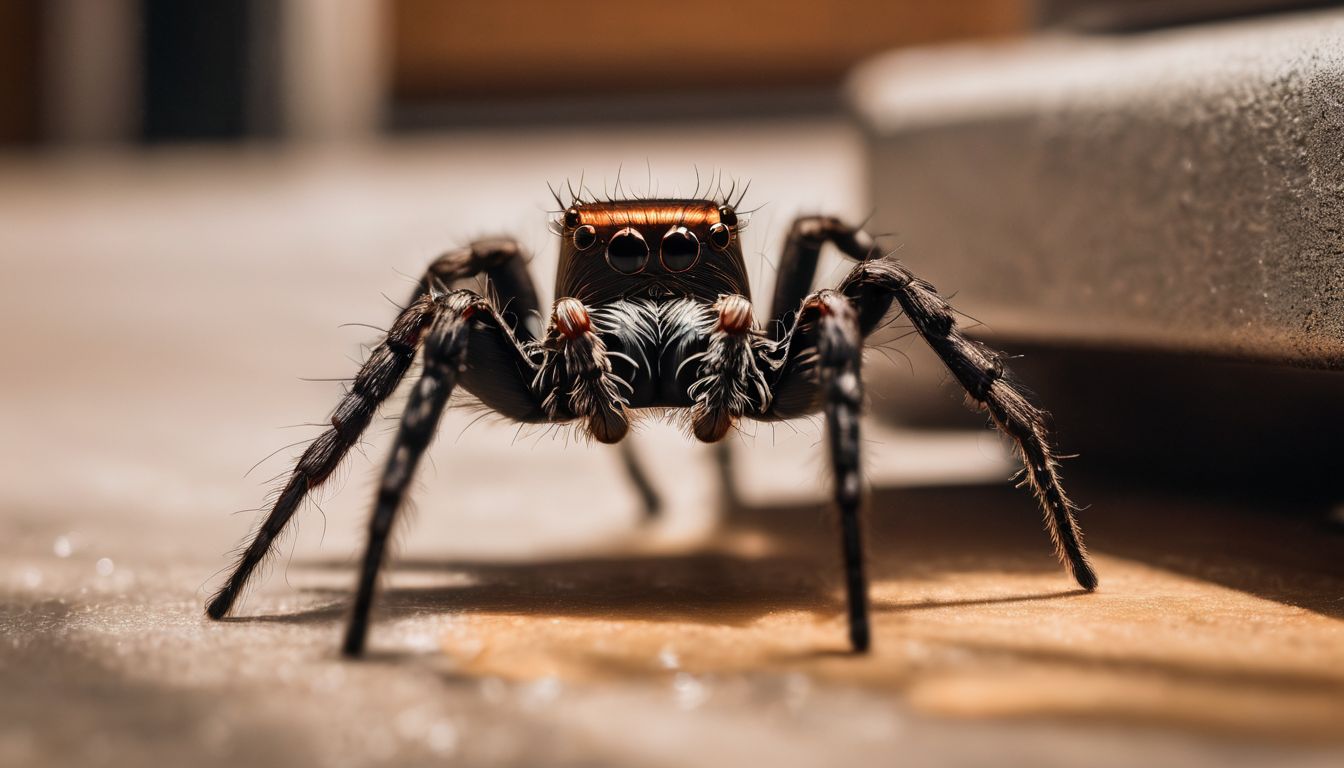Introducing to the audience the answer of one of their most asked questions: Does Lysol kill spiders? Spiders can be a cause for fear and discomfort, as well as carry disease or mess in your house.
People have been using Lysol Disinfectant Spray with varied success over the years, but what is its effectiveness on spiders specifically? In this blog post, we will dive deeper into destroying spiders using Lysol and provide some alternatives methods too.
If you’re curious about fighting back against unwanted spider visitors, keep reading to find out all that you need to know!
Key Takeaways
- Lysol Disinfectant Spray is effective in killing spiders when applied on them directly.
- Spraying a surface or area where the spider may be located will likely not do much, so it is important to spray onto the spider itself.
- Wear protective gloves and ensure proper ventilation while spraying Lysol to protect your health.
- Vacuuming with an attachment, broom & dustpan, water spray bottle, and trapping them in a jar are alternative methods for removing spiders from your home.
Does Lysol Kill Spiders?
Lysol Disinfectant Spray has been proven to be effective in killing spiders when applied on them directly.
Effectiveness of Lysol Disinfectant Spray on Spiders
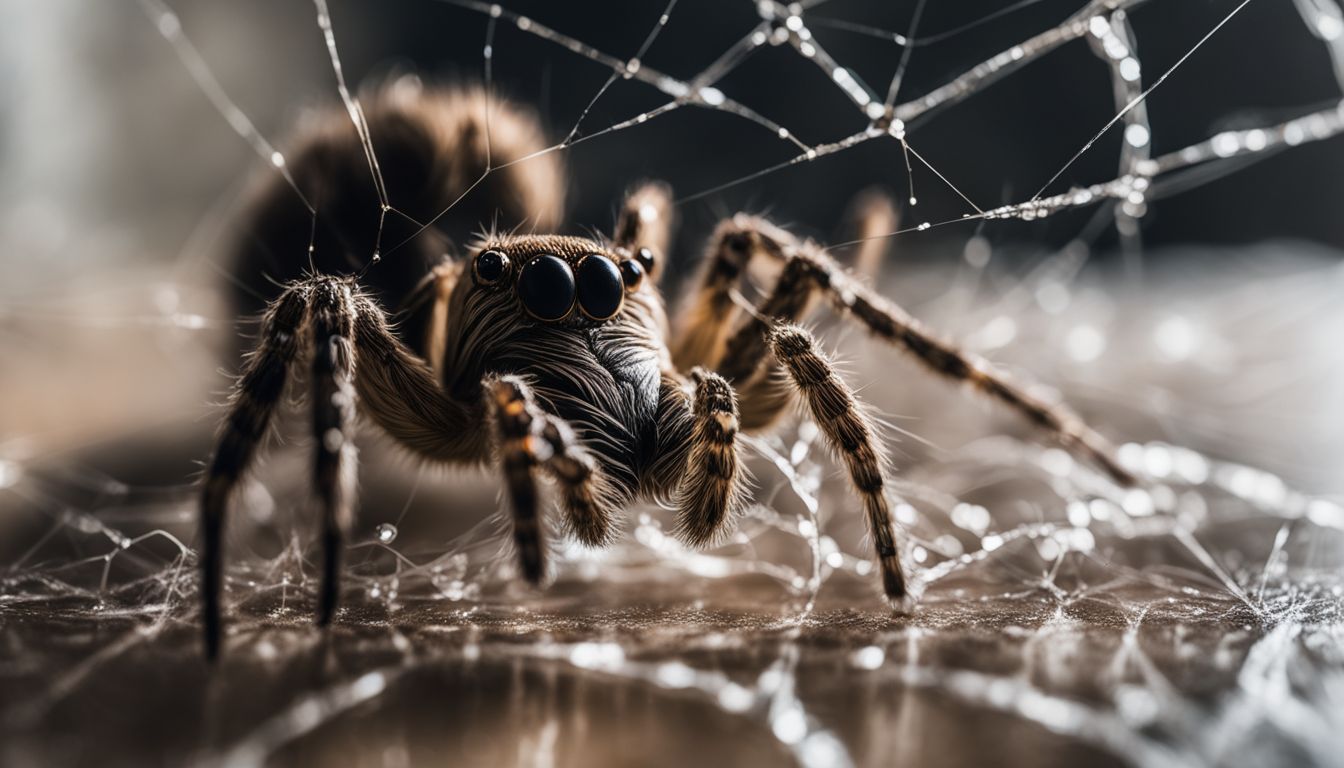
Lysol disinfectant spray is composed of a powerful cleaning agent that has the capability to kill spiders. Lysol works by interfering with the respiratory openings of spiders, thus clogging it up and causing them to suffocate.
While this method may not instantly kill them, it will eventually cause their death when sprayed directly onto them or in their vicinity. This makes Lysol an effective solution for getting rid of spiders but it must be used cautiously as careless application might end up damaging furniture and other surfaces within your home too.
Furthermore, extra safety precaution needs to be taken if you have pets such as dogs or cats inside your house so they don’t get exposed to its harmful effect once sprayed into the air.
How Lysol kills spiders by interfering with respiration
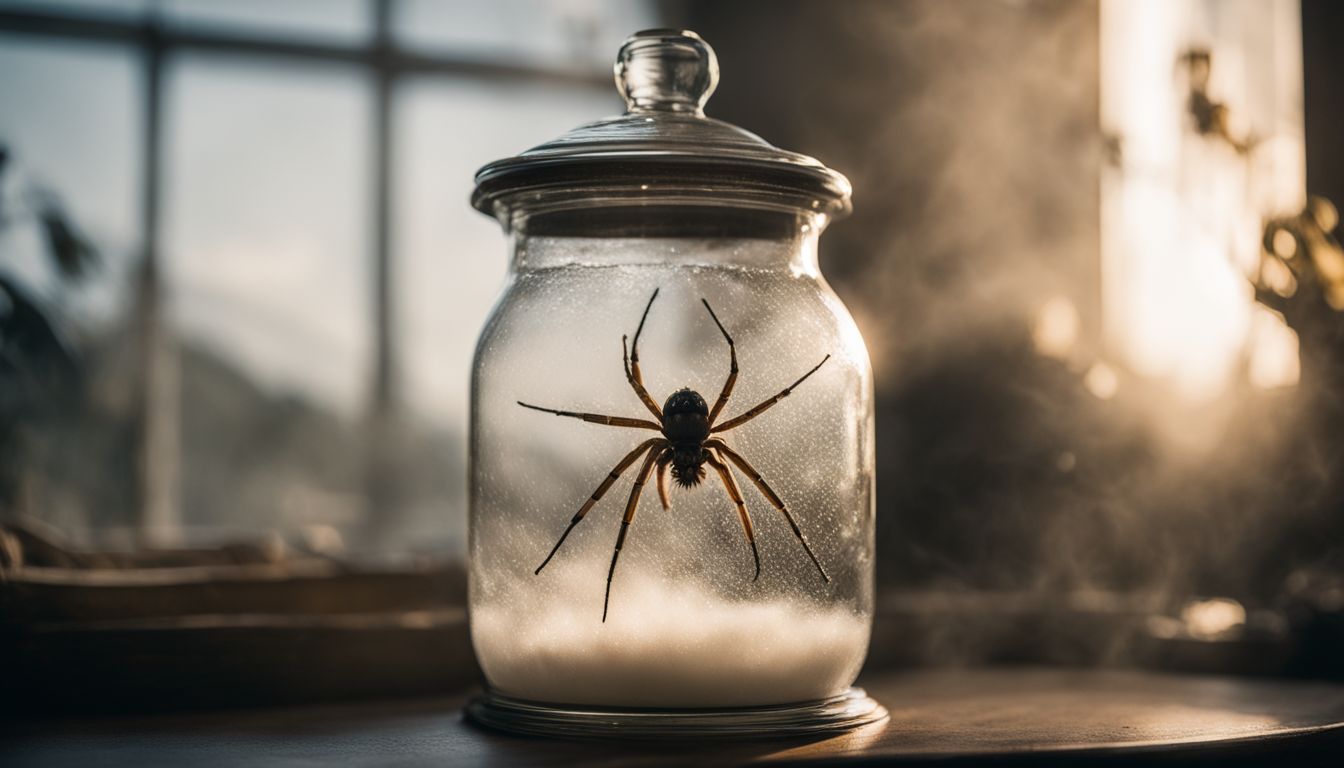
Lysol is effective in killing spiders due to how it interferes with their respiration. This interference occurs by clogging the respiratory openings of the spider and ultimately leads to its death.
Lysol Disinfectant Spray contains a compound called diisobutylphenoxyethoxyethyl dimethyl benzyl ammonium chloride, that when released upon contact with air, disrupts the way spiders breathe.
A significant amount of this spray—nearly half a can—would need to be applied directly onto an arachnid for successful results. Contrary to popular belief, however, Lysol isn’t as effective on other insects such as mosquitoes or beetles as it is on spiders which are naturally more resistant to insecticides like these.
Using Lysol to Kill Spiders
it is important to remember the proper application methods for using Lysol in order to effectively kill spiders, as well as taking necessary safety precautions.
Proper application techniques
When using Lysol to kill spiders, it is important to ensure that the spider is directly sprayed. Due to its relatively low volatility, simply spraying a surface or area where the spider may be located will likely not do much in terms of killing them.
To properly apply Lysol, one should hold the bottle no more than 12 inches away from his/her target spider and use short bursts of spray specifically towards him/her. Doing so ensures that all surfaces are adequately covered with the spray and allows for complete coverage of even hard-to-reach spots.
Additionally, be careful not to aim too close as this could risk dispersing aerosols into your eyeballs or other sensitive areas on your body. It’s also helpful to empty out any sources and hideouts nearby where spiders might congregate or live around before reaching for the Lysol Disinfectant Spray – doing so increases efficiency by significantly cutting down on unnecessary reapplications once you take care of those potential homes for insects right off the bat!
Safety precautions
When using Lysol or any other cleaning product to kill spiders, it is important to take certain safety precautions. These precautions include wearing protective gloves and ensuring proper ventilation while spraying the product in order to protect your health.
Moreover, never spray directly onto the spider; instead, spray into a cloth and use that to cover the spider if needed – this protects both you and the spider from badly damaged lungs due too direct inhalation of Lysol Disinfectant Spray.
Additionally, avoid contact with skin since some chemicals found in such products may be dangerous if they come into contact with human skin for extended periods of time. Above all else make sure you keep these very simple but incredibly important rules in mind while attempting any kind of elimination regarding pesky household pests!
Alternatives to Lysol
If Lysol is not your preferred method of killing spiders, there are several other methods that you can consider such as using a vacuum with an attachment, a broom and dustpan, a water spray bottle or trapping them in a jar.
Vacuum with attachment
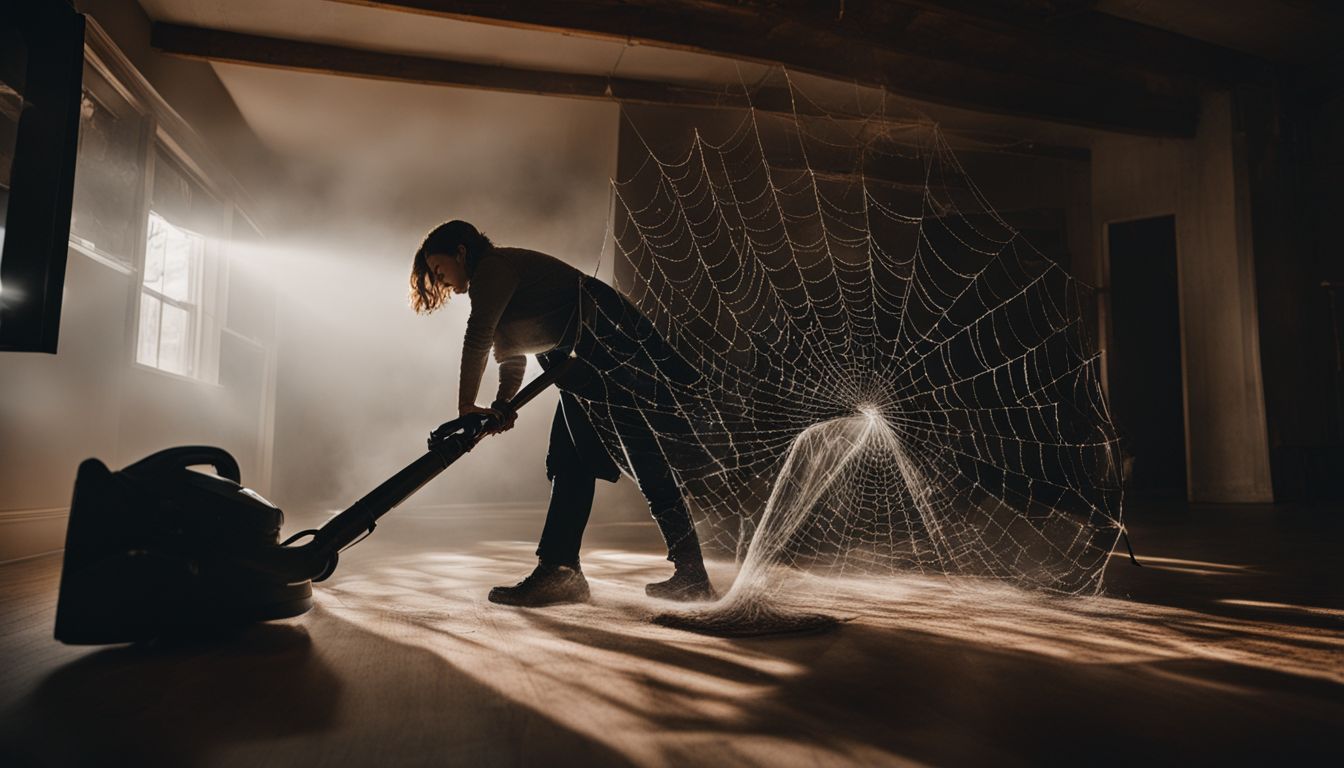
Using a vacuum with an attachment is another effective way to get rid of spiders since they can easily be sucked into the vacuums hose and nozzle. This method is great for larger or more visible spiders, like wolf spiders.
To use this tool effectively make sure that the surface of the area you are trying to clean has been thoroughly cleared prior so that no webs remain, then start vacuuming in regular strokes covering all parts of the room.
Try to move slowly when doing this; some spiders may try to evade capture by running away so keep a close eye out! Additionally, using blades at certain angles from your nozzle will help scrape off cobwebs if there are any leftover particles on corners or surfaces that haven’t been reached yet.
Broom and dustpan

Using a broom and dustpan is an effective and safer way for novices to remove spiders from their home or other areas. The bristles of the broom can be used to gently gather and collect any visible spiders, including webs, while the dustpan keeps them contained before depositing them outside.
When using this method it’s important to wear gloves and safety glasses if necessary since most spider species have venom that can cause irritation upon contact with skin. After collecting the spider in the dustpan, carefully place a lid on top so that it cannot escape while remaining sufficiently ventilated until transferred outdoors, especially during warm seasons when heat retention might endanger its life within an airtight space.
Finally, depose of the container away from your property lines out of reach of children or pets who may accidentally come into contact with spiders found inside.
Water spray bottle
With a water spray bottle, you may only be able to control the spiders rather than kill them. This method of removal is temporary and can provide relief but it won’t completely rid your home of spiders.
It’s important to note that straight lysol disinfectant can damage certain surfaces; therefore, diluting Lysol in a 1:8 ration with water before using it in a spray bottle will help mitigate any potential damages which could occur.
When spraying the solution onto spiders or their hiding spots, make sure there is good ventilation as some insecticides and cleaning agents contain chemicals that are hazardous when inhaled if too much airborne residue accumulates in an area over time without proper dispersion.
Trap them in a jar
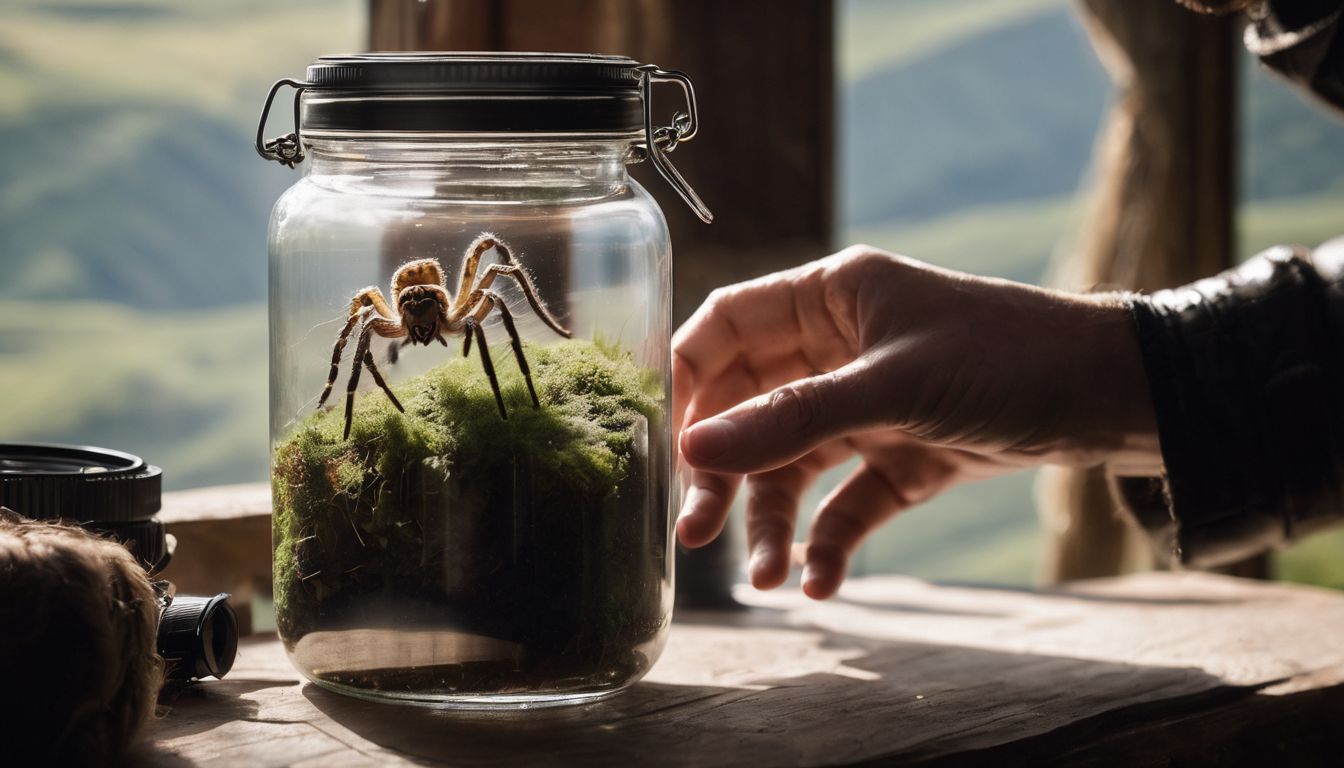
Trap jar is a simple and effective way to capture spiders that are present in your home. To trap them in a jar, you will need only two supplies – a clear sealed jar and thick gloves.
First, take the thick gloves and put them on so that your hands are safely protected from any possible spider bite. Now carefully slide the jar over the spider. Make sure you secure the lid tightly as spiders may try to escape when they come into contact with air outside of their contained environment.
Once secured take it outside far away from your house or release it within your garden area but not near any windows or doors of your residence,.
Conclusion

The findings show that Lysol is indeed an effective way of killing spiders when applied directly to them. It works by interfering with their respiration process, and eventually paralyzing them.
However, due to the time and amount of Lysol required for a single spider kill, it may not be the most efficient method for controlling an infestation over a large area or long period of time.
Alternative methods such as vacuuming with an attachment or using water spray bottles may also be suitable solutions in some cases. Ultimately, regardless if you use Lysol or other materials like vinegar or bleach; proper application techniques and safety precautions must always be taken into account when attempting to control any pest infestations around your home.
Keep in mind that specialized insecticides are available should you need more control over your pests – these products have been specially designed to effectively kill insects like spiders so they won’t return again!
FAQs
1. Does Lysol kill spiders?
Yes, spraying Lysol on spiders can help to kill them and reduce spider infestations in your home.
2. How often should I use Lysol spray to kill spiders?
No, it is not recommended for long-term control of spider infestations as the effects may be temporary. For best results, use a professional pest management service if the problem persists.
3. Is Lysol safe to use around pets or children?
Yes, but you should always read labels carefully before using any chemical products around pets and children. It is important to keep both people and animals away from an area that has been sprayed with Lysol for at least one hour after application.
4. Are there other methods of eliminating spiders besides using Lysol?
Yes, vacuuming up visible webs combined with regular maintenance such as sealing cracks or mending screens are effective steps for controlling spider populations inside homes without having to constantly spray chemicals like lysol

